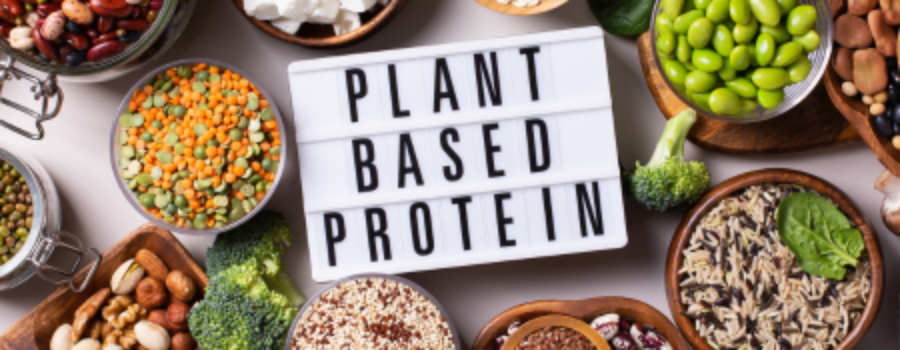
Many people seeking a more sustainable and healthful diet are choosing plant-based proteins. In addition to being rich in vital nutrients, these proteins help lessen the adverse effects of food production on the environment. Thanks to the abundance of sources available, finding plant-based proteins that fit your dietary requirements and preferences is now simpler than ever.
Discover 18 delicious and nutritious plant-based proteins you can include in your diet.
1. Lentils

Lentils are a mainstay in many plant-based diets because they offer a flexible and reasonably priced source of protein. They have distinct textures and flavors and come in various colors, such as red, brown, and green. Iron, folate, and fiber—vital for general health—are abundant in lentils. They can be used as a base for vegetarian burgers and in salads, stews, and soups.
2. Quinoa
Quinoa is a complete protein encompassing all nine essential amino acids that the body cannot synthesize independently. This ancient grain is gluten-free and rich in fiber, iron, magnesium, and manganese. Its light, airy texture and nutty flavor make it an excellent foundation for salads, bowls, and side dishes. Quinoa is simple to prepare and may be included in savory and sweet dishes.
3. Chickpeas
Garbanzo beans, another name for chickpeas, are a nutrient-dense protein source frequently used in Middle Eastern and Mediterranean cooking. They are rich in fiber, protein, vital minerals, and vitamins, including folate and iron. You can eat chickpeas in salads, stews, hummus, and roasted snacks, among other ways. Because of their adaptability and subtle flavor, they are a great complement to any diet.
4. Tempeh
Tempeh, a fermented soybean food, is defined by its solid texture and nutty taste. It’s heavy in probiotics, protein, and minerals, including calcium and iron. Tempeh’s nutritional profile has improved, and its digestion has been simpler via fermentation. Grilling, sautéing, or adding Tempeh to stir-fries and sandwiches are just a few ways to cut, marinate, and cook it.
5. Edamame
Edamame is young soybeans harvested before they ripen, offering a sweet and mild flavor. These green beans are rich in protein, fiber, and essential vitamins and minerals, making them a nutritious snack or addition to meals. Edamame can be steamed, added to salads, or blended into dips. They are also a great source of antioxidants and help promote heart health.
6. Tofu.
Made from soybeans, tofu is a very flexible protein source with different aromas and textures based on cooking techniques. For plant-based diets, it is a good source of iron, calcium, and protein. Many recipes call for tofu as a meat replacement, stir-fried, grilled, mixed into smoothies, or used otherwise. Its adaptability makes it a favorite for those trying to vary their protein intake.
7. Chia Seeds
Chia seeds are a nutritional powerhouse, offering significant protein, fiber, omega-3 fatty acids, and antioxidants. When mixed with liquid, they form a gel-like consistency, making them perfect for puddings, smoothies, and baking. Chia seeds can also be sprinkled on yogurt, oatmeal, or salads for a nutrient boost. Their versatility and health benefits make them a great addition to any diet.
8. Hemp Seeds
Hemp seeds are small but mighty. They provide a complete source of protein, healthy fats, and various essential nutrients. They are rich in omega-3 and omega-6 fatty acids, which benefit heart health and reduce inflammation. Hemp seeds can be sprinkled on salads, blended into smoothies, or used in baking. Their nutty flavor and crunchy texture add a delightful element to many dishes.
9. Black Beans
Black beans are a staple in many cuisines, known for their rich flavor and high protein content. They are also an excellent source of fiber, iron, magnesium, and antioxidants. Black beans can be used in various dishes, including soups, stews, salads, and burritos. Their creamy texture and ability to absorb flavors make them a versatile and nutritious protein option.
10. Pumpkin Seeds
Pumpkin seeds, also known as pepitas, are a nutritious and tasty source of plant-based protein. They are high in antioxidants, healthy fats, and essential minerals like zinc and magnesium. Pumpkin seeds can be eaten independently, added to salads, or used in baking and cooking. Their crunchy texture and slightly nutty flavor are delightful to many dishes.
11. Peas
Peas are a simple and nutritious protein source that can be easily incorporated into many dishes. They are rich in protein, fiber, vitamins, and minerals, including vitamins K, C, and manganese. Peas can be enjoyed fresh, frozen, or canned and are often added to soups, salads, and stir-fries. Their sweet flavor and tender texture make them a family-friendly option.
12. Almonds
Almonds are protein-packed nuts containing healthy fats, fiber, and essential nutrients like vitamin E and magnesium. They can be enjoyed as a snack, added to salads, or used in baking and cooking. Almonds are also available in various forms, such as almond butter and almond milk, offering multiple ways to include them in your diet. Their crunchy texture and rich flavor make them a popular choice for plant-based protein.
13. Spirulina
Spirulina is a blue-green algae rich in protein, vitamins, and minerals. It is often available in powder or tablet form and can be added to smoothies, juices, or energy bars. Spirulina is also a good source of antioxidants and has anti-inflammatory properties. Its unique nutritional profile makes it a powerful addition to a plant-based diet.
14. Amaranth
Amaranth is an ancient grain that is a complete protein, containing all the essential amino acids. It is also rich in fiber, iron, magnesium, and phosphorus. Amaranth can be cooked in porridge, salads, or as a side dish. Its nutty flavor and slightly crunchy texture make it a delicious and nutritious meal addition.
15. Sunflower Seeds
Sunflower seeds are a convenient and nutritious snack that provides protein, healthy fats, vitamins, and minerals. They are exceptionally high in vitamin E, which is essential for skin health and immune function. Sunflower seeds can be eaten independently, added to salads, or used in baking. Their mild flavor and crunchy texture make them a versatile protein source.
16. Buckwheat
Buckwheat is another complete protein that is also gluten-free, making it an excellent option for those with gluten sensitivities. It is high in fiber, magnesium, and antioxidants, contributing to heart health and blood sugar control. Buckwheat can be used in various dishes, such as pancakes and porridge, or as a base for salads. Its earthy flavor and hearty texture make it a versatile grain.
17. Nutritional Yeast
Nutritional yeast is a deactivated yeast high in protein and vitamins, particularly B12 and minerals. Its cheesy flavor makes it a popular addition to vegan dishes like pasta, popcorn, and sauces. Nutritional yeast also supports immune function and overall health. Its unique flavor and nutritional benefits make it a valuable addition to plant-based diets.
18. Peanuts
Peanuts are protein-rich legumes that provide healthy fats, fiber, vitamins, and minerals. They can be enjoyed as a snack, made into peanut butter, or added to different dishes for a protein boost. Peanuts are also high in antioxidants and have been linked to heart health. Their rich flavor and satisfying crunch make them a favorite among plant-based eaters.




Leave a Reply
Your email is safe with us.